Intro
Identifying Bowel Obstruction Symptoms: Causes, Signs, and Treatment. Learn to recognize the warning signs of bowel obstruction, including abdominal pain, vomiting, and constipation. Understand the causes, diagnosis, and treatment options for this medical emergency, and discover how to alleviate symptoms and prevent complications.
Bowel obstruction is a serious medical condition that can be life-threatening if left untreated. It occurs when a blockage or obstruction prevents the normal flow of food, fluid, and gas through the intestines. This blockage can cause severe abdominal pain, vomiting, constipation, and other symptoms that can significantly impact a person's quality of life. Recognizing the symptoms of bowel obstruction is crucial to receive timely medical attention and prevent complications.
A bowel obstruction can occur in anyone, but it is more common in older adults and people with certain medical conditions, such as inflammatory bowel disease, hernias, and abdominal cancer. The symptoms of bowel obstruction can vary depending on the location and severity of the blockage. However, there are some common signs and symptoms that people should be aware of to seek medical help promptly.
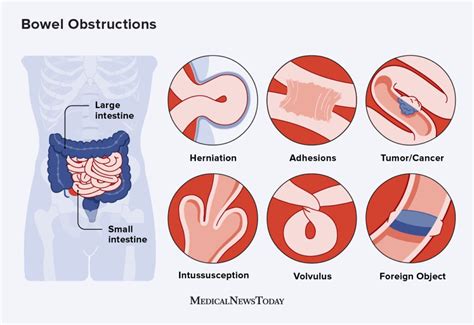
What are the Symptoms of Bowel Obstruction?
The symptoms of bowel obstruction can be categorized into two main types: partial and complete. Partial bowel obstruction occurs when the blockage is not complete, allowing some food, fluid, and gas to pass through the intestines. In contrast, complete bowel obstruction occurs when the blockage is total, preventing any food, fluid, and gas from passing through.
Partial Bowel Obstruction Symptoms:
- Abdominal pain or cramping that comes and goes
- Bloating and discomfort
- Nausea and vomiting
- Diarrhea or constipation
- Abdominal tenderness to the touch
Complete Bowel Obstruction Symptoms:
- Severe abdominal pain that worsens over time
- Vomiting bile or fecal matter
- Abdominal tenderness to the touch
- Abdominal swelling or distension
- No passing of gas or stool
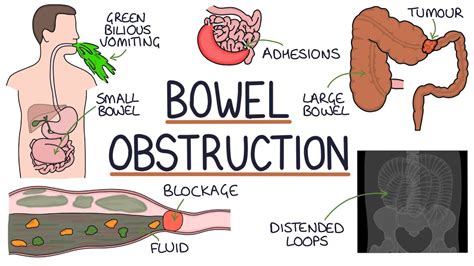
Causes of Bowel Obstruction
Bowel obstruction can be caused by various factors, including:
- Adhesions or scar tissue from previous surgery
- Hernias, such as inguinal or umbilical hernias
- Inflammatory bowel disease, such as Crohn's disease or ulcerative colitis
- Abdominal cancer, such as colon or ovarian cancer
- Intussusception, where a part of the intestine telescopes into another part
- Volvulus, where the intestine twists around its mesentery
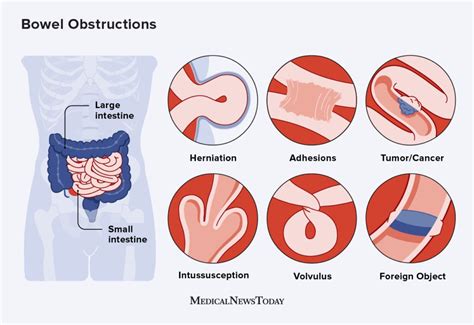
Diagnosis and Treatment of Bowel Obstruction
Diagnosing bowel obstruction typically involves a combination of physical examination, medical history, and diagnostic tests, such as:
- Abdominal X-rays or CT scans to visualize the intestines
- Endoscopy to examine the inside of the intestines
- Blood tests to check for signs of infection or inflammation
Treatment of bowel obstruction depends on the underlying cause and severity of the blockage. In some cases, bowel obstruction can be treated with:
- Fluid replacement and bowel rest
- Medications to manage pain and vomiting
- Endoscopic procedures to remove the blockage
- Surgery to repair or remove the affected intestine
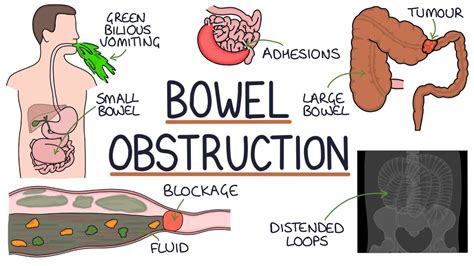
Complications of Bowel Obstruction
If left untreated, bowel obstruction can lead to serious complications, such as:
- Intestinal perforation, which can cause peritonitis
- Intestinal ischemia, which can cause tissue death
- Malnutrition and dehydration
- Electrolyte imbalances
- Sepsis
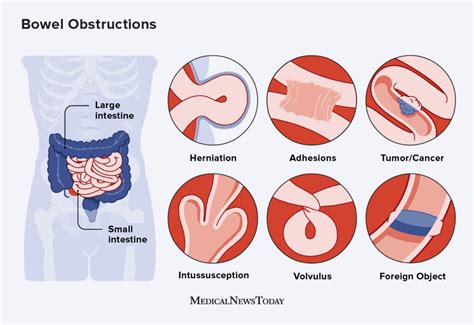
Prevention of Bowel Obstruction
While some cases of bowel obstruction cannot be prevented, there are steps that can be taken to reduce the risk:
- Eating a high-fiber diet to promote regular bowel movements
- Staying hydrated to prevent constipation
- Avoiding foods that can cause blockages, such as seeds or popcorn
- Managing underlying medical conditions, such as inflammatory bowel disease
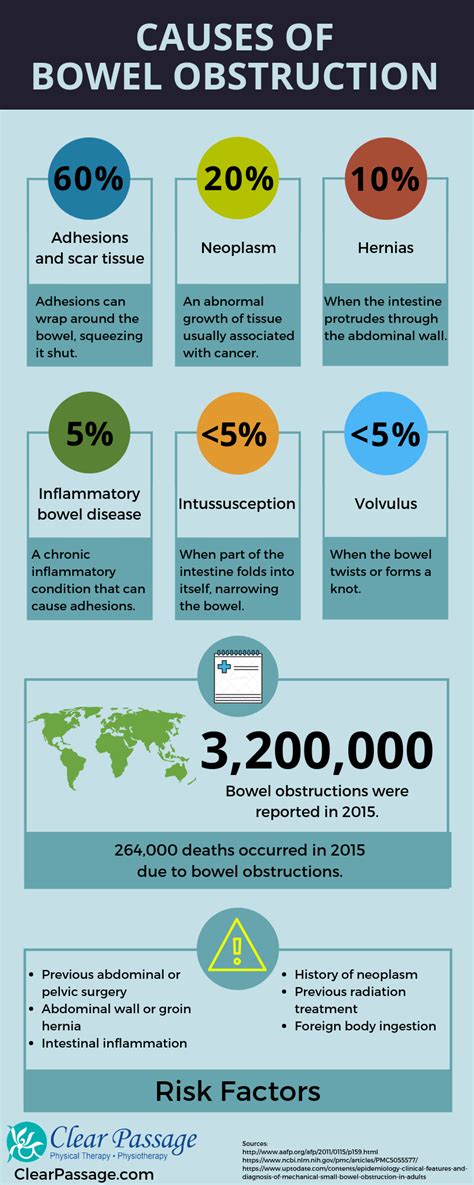
In conclusion, bowel obstruction is a serious medical condition that requires prompt attention. Recognizing the symptoms and seeking medical help early can prevent complications and improve treatment outcomes. By understanding the causes, diagnosis, and treatment of bowel obstruction, individuals can take steps to reduce their risk and promote overall health and well-being.
What are the symptoms of bowel obstruction?
+The symptoms of bowel obstruction can include abdominal pain, vomiting, bloating, diarrhea or constipation, and abdominal tenderness to the touch.
What are the causes of bowel obstruction?
+Bowel obstruction can be caused by adhesions or scar tissue, hernias, inflammatory bowel disease, abdominal cancer, intussusception, and volvulus.
How is bowel obstruction diagnosed?
+Bowel obstruction is typically diagnosed with a combination of physical examination, medical history, and diagnostic tests, such as abdominal X-rays, CT scans, and endoscopy.
What are the complications of bowel obstruction?
+If left untreated, bowel obstruction can lead to complications, such as intestinal perforation, intestinal ischemia, malnutrition, dehydration, electrolyte imbalances, and sepsis.
How can bowel obstruction be prevented?
+While some cases of bowel obstruction cannot be prevented, eating a high-fiber diet, staying hydrated, avoiding foods that can cause blockages, and managing underlying medical conditions can reduce the risk.
